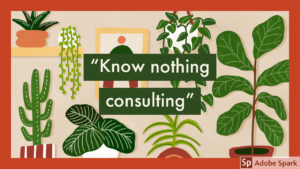We love Allan Cooney’s innovative approaches to business which comes from being a graduate of the “Hard School” (see his earlier article on this blog). We love it because it proves that people who have fallen on hard times in business, have greater wisdom and capacity of thought to identify new ways of doing things. In this next Article Allan shows a different approach to consulting, where the consultant does more listening, than….not listening. (That will be a huge change for many well established consultants and advisers who have done exactly that – not listened and provided the wrong advice which only created more problems. Sad, but true).

Posts on Linkedin are limited to 1300 charcters and what I have to say here is a bit wordier – so it becomes an article.
Over the past 12 years or so I have run a side gig I call to myself “Know Nothing Consulting”. It is occasional work, and I treat it as very confidential, for CEO’s and other senior executives. I find it very personally rewarding, mainly because I have often wanted, needed and used a similar process for myself, so its good to repay to someone else. We all have our mentors and sounding boards and this is what this is. It falls somewhere in between coaching, counselling, peer support and consulting.
The big chair can get very lonely and having someone who has walked the walk to speak candidly and vulnerably with is a rare and valuable thing. The basic premise is that I know nothing about the company, problem or solution (or often, even the individual) – the person I am consulting with knows all this – the challenge they have is that often they can’t see Wally in the crowd.
Because I know nothing, they need to unpack the whole issue(s) and get in order how things function so someone who knows nothing can understand it. Remember when your 3YO kept asking “WHY!!”, it’s a bit like that though, “just because” doesn’t count as an answer. The only real format is – You talk – I listen and ask questions.
I learned the approach from a scientist I worked with for a couple of years about 15 years ago and he introduced me to the concept of reductionism. I won’t take a deep dive into the definition now, it is both simple and complex – google it – but the basic idea is to analyse and describe a complex problem in terms of its simple or fundamental component parts. The problematic can then be isolated, either within a constituent part or where the various parts interface. As he said to me, and I subsequently proved, the real problem is so often very different to what people think it is. Solutions get much more obvious when you are looking directly at the problem. It’s quite remarkable how well this works and how often the solution was always there, just out of sight.
I have not ever promoted this and it’s been word-of-mouth to date , mainly because I have been quite limited for time ( I have (had) a job, a life and I am a very active artist) and it is something I am quite selective with. However, I will have more availability for a while and if you are interested, message me and we can chat about what is involved.
Allan Cooney spent quite a few years consulting to the NFP sector helping non-profits act commercially while not losing sight of their fundamental objectives. A sometimes narrow and tricky path.
Twenty-five years ago he started consulting with an indigenous group in Australia, setting up governance and management structures. And, over the course of the years and multiple projects since, has set up 2 new aboriginal economies and a number of businesses within those economies.
Up until January 2020, Allan was Chair of one of those companies that creates and sells carbon credit units to companies like Qantas, National Australia Bank et al. The whole premise being that aboriginal people stay on their land, practice traditional stewardship and sell a commercial product to the world, breaking the social security nexus. Its far more fundamental than profit driven enterprise even though it is profitable.
What he established and has now proved to be most useful is a very different business model for this type of enterprise. It was actually nominated for a Northern Territory innovation award in 2007 – won no prizes, a set of linked legal agreements is not too sexy and doesn’t play well on awards night but it is still the go to model now for these types of businesses.
A law professor from the Australian National University later ratified it for Allan and uses it in his teaching.